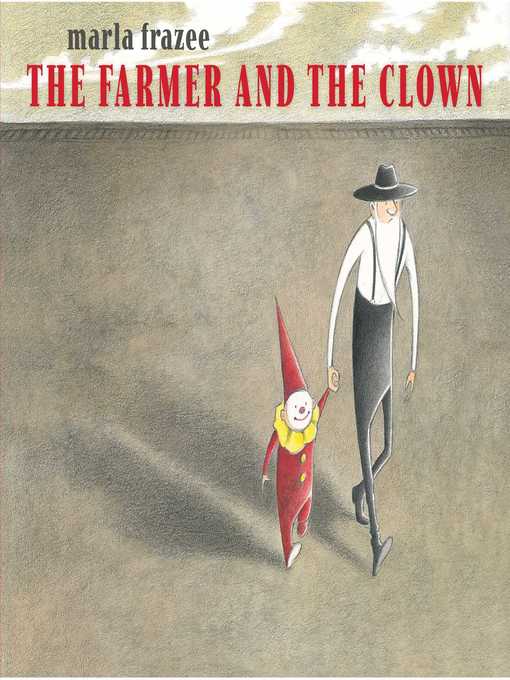
The Farmer and the Clown
کتاب های مرتبط
- اطلاعات
- نقد و بررسی
- دیدگاه کاربران
نقد و بررسی

Starred review from September 8, 2014
Frazee (Boot & Shoe) crafts an affecting wordless narrative about a solitary man and his unexpected visitor. The action transpires on an austere gray-brown prairie beneath a dust-colored sky, where a frowning farmer watches a colorful circus train bouncing along a rough track. The slim, white-bearded farmer, dressed in a somber black hat and overalls, is startled to see a knee-high clown ejected from the caboose. The slouching farmer approaches the clown, who mimes the accident and rushes to be comforted. Back at the farmer's cabin, the clown washes the paint off his face, revealing a mouth turned down in a child's sorrow. The next day, the farmer cavorts to cheer him up, improving his own mood in the process; the companions milk a cow and juggle fresh eggs, to the dismay of four hens. Frazee expertly paces the story in sequential panels, implying the grandfatherly man's growing tenderness for the lost child. The circus train's return feels bittersweet until readers observe that the farmer will not be alone for long. A gorgeously executed account of the power of companionship and compassion. Ages 4â8. Agent: Steven Malk, Writers House.

Starred review from September 15, 2014
A solitary farmer on an empty plain receives the most unlikely visitor. A tall, scowling farmer labors with a pitchfork on an endless brown field. In the distance, surprisingly, a steam train crosses the horizon. As the train chugs off the edge of the spread, a jolt propels something off the caboose. The startled farmer sets out in that direction. He finds a small clown, wearing white makeup, a red-and-yellow costume and a broad smile. The clown deftly pantomimes having fallen off the train-action and emotion shine wordlessly-and the farmer takes him home. Silently they stare at each other, eat and wash their faces. Without makeup, the child-clown's smile disappears; is he sad to lose that connection to his home-train, or had the smile been made of makeup all along? With growing tenderness, the farmer watches over his sleeping guest and, come morning, hops and dances to cheer him up. They juggle eggs and share real farmwork until the circus train returns along the distant tracks. Its shape and primary colors make it look like a toy, especially against the soft, textured grays and browns of the farm, skies and earth. Using gouache and black pencil, Frazee-a virtuoso of mood and line-takes the surly farmer through bafflement, contemplativeness and true affection.The beauty of an unexpected visit, done beautifully. (Picture book. 3-6)
COPYRIGHT(2014) Kirkus Reviews, ALL RIGHTS RESERVED.

Starred review from August 1, 2014
PreS-Gr 2-Frazee's controlled palette of subdued golds, browns, and grays offers a fitting backdrop for the hard-working farmer foregrounded in this wordless tale. Bent over his wheat, he misses the drama above as sweeping cloud formations bleed off the page. A swiftly moving circus train on the horizon introduces color and an unexpected visitor, when a bump on the tracks ejects a young clown. Exuberance meets quiet responsibility as the whirlwind in a red one-piece, the small clown, embraces the legs of the old man. Their similar silhouettes invite comparison, while their hats (one black and wide-brimmed, the other red and conical) suggest contrast. Hand in hand, they enter the farmhouse, where softly textured gouache and black pencil scenes in panels of varying shapes and sizes depict shared meals and ablutions, a protective night watch, and unanticipated antics as rust-colored long johns seem to conjure the farmer's playfulness. The bond, conveyed visually through mirrored motions, continues to develop until the train returns. Readers will wonder how to feel in the penultimate scene until they notice a clown with a black hat waving from the caboose, and the final page contains another surprise. This is a tender look at light and shadow, the joy and comfort in companionship, the lift that laughter provides, and the friendship possible among generations (and species). The poignant relationship calls to mind the quiet potency of scenes in Raymond Briggs's The Snowman (Random, 1978) and Sarah Stewart's The Gardener (Farrar, 2007). Lovely.-Wendy Lukehart, District of Columbia Public Library
Copyright 2014 School Library Journal, LLC Used with permission.

October 1, 2014
Preschool-G In this wordless picture book, a bearded farmer is alarmed to see a young clown tumble out of a passing circus train. The farmer takes the lost big-top performer home and feeds him, but then, as they wash their faces before bed, the young clown loses his makeup and his moxie. The next morning, the farmer works hard to cheer up the boy by making funny faces, and the boy enlivens the farm chores with a series of tricks. Eventually the circus train passes again, and the boy and the farmer rush to get the little clown back to his clown family, who clearly miss him. Frazee uses a muted color palette that matches the quiet, gentle mood of the story. Her simply drawn characters with minimal facial features beautifully convey emotions, particularly when the dour farmer has more pep in his step after he and the clown go separate ways (but trade hats first). Little ones will delight in the farmer clowning around to the last page, which promises a fun surprise for the old man.(Reprinted with permission of Booklist, copyright 2014, American Library Association.)

























دیدگاه کاربران